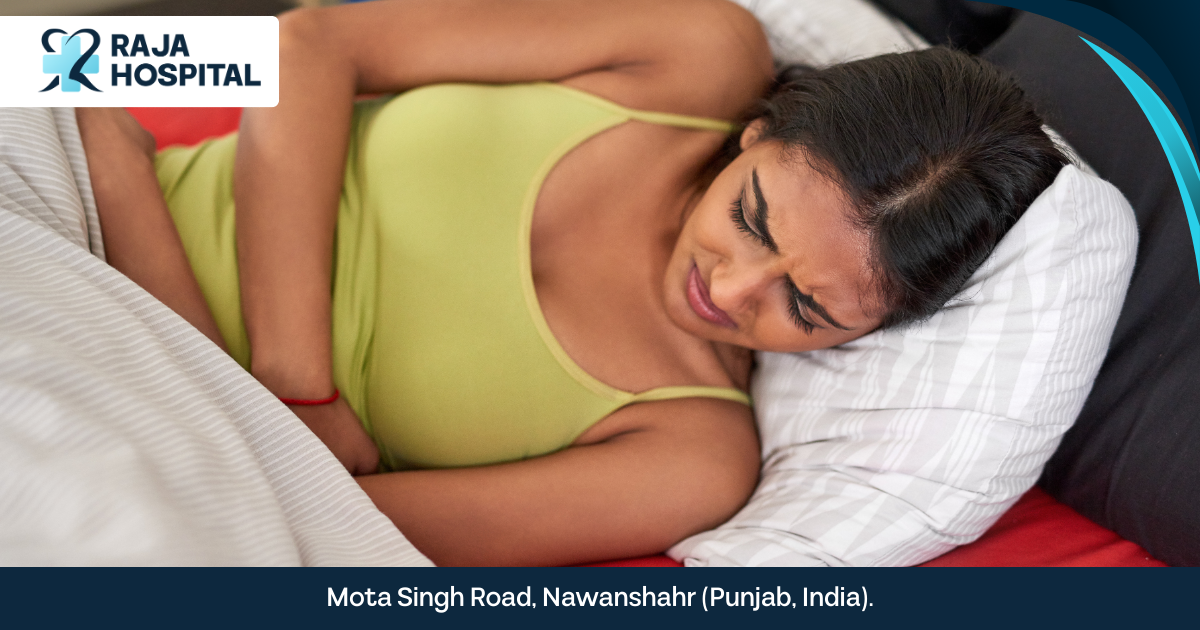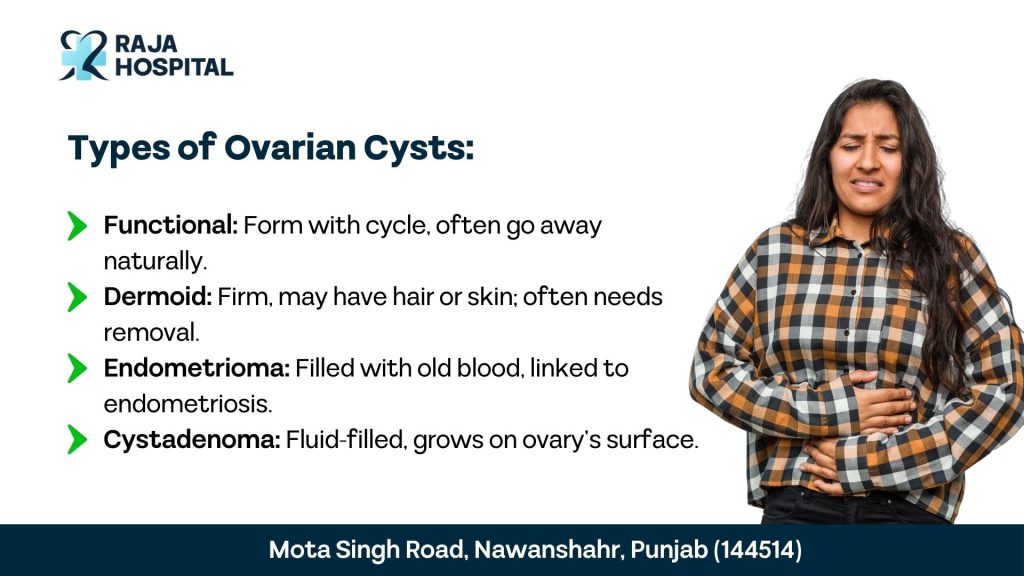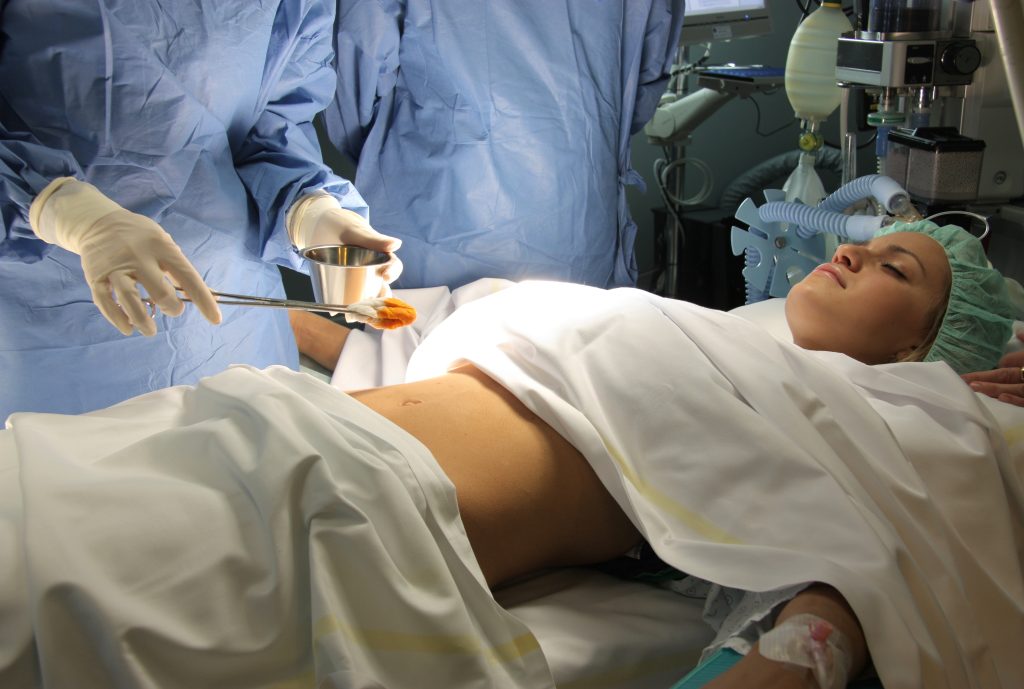Ovarian Cyst Removal in Punjab: Answered by Experts

REVIEWED BY DR. LAKSHITA SAINI (MBBS, MS OBS & GYNAE) ON 25th November 2024
Waking up to another night of pain in your lower abdomen—wondering if it’s just a stomach ache, or something more serious. Tossing back and forth in bed, struggling to sleep—feeling frustrated because you don’t know what’s causing the discomfort. You don’t understand how these recurrent painful stomach aches could be linked to your ovaries. But should you be concerned? You feel so alone and confused. Through this post, you’ll learn everything you need to know about ovarian cysts, why one might need to be removed, and how new, cutting-edge medical care at Raja Hospital could bring a new pain-free life. Although it may be hard asking for help, remember you are never alone!
Struggling with same?
Book Your Appointment With Our Expert Doctors

What Are Ovarian Cysts?
Ovarian cysts are small fluid-filled sacs that occur within or on the surface of the ovary. While some cysts are harmless and go away on their own, others can lead to big problems if left untreated.

Types of Ovarian Cysts:
Ovarian cysts can take different forms, and each type has unique characteristics and symptoms. Learn about the most common types below:
- Functional Cysts: These form during the menstrual cycle. They don’t usually cause any symptoms and often go away in a few months.
- Dermoid Cysts: Firmer to the touch thanks to the tissues —hair, skin, or teeth— inside. They can grow, and they should be removed.
- Endometriomas: These cysts are related to endometriosis and contain old blood.
- Cystadenomas: They grow on the surface of the ovary and may be filled with watery or mucous material.
With a number of different types, understanding what specific kind you might have is crucial in taking control of your body.
Causes and Risk Factors
Ovarian cysts can develop for several reasons, some more common than others. Below are a few of the most common causes and factors that increase the risk of ovarian cysts:
- Hormonal Factors: Hormonal imbalances can lead to cyst formation.
- Pregnancy: Some cysts develop as part of the natural process during early pregnancy.
- Endometriosis: This condition often causes painful cysts known as endometriomas.
- Severe Pelvic Infections: Infections that spread to the ovaries can cause cyst formation.
Knowing these risk factors can help you take preventive measures and understand when medical attention might be necessary.
Why Do Ovarian Cysts Need Removal?

In many instances, cysts don’t require surgical removal; they may shrink or might resolve on their own. However, certain cysts may cause health complications that necessitate surgical intervention.
Indications That Surgery Is Needed
Some cysts don’t always reveal symptoms, but whenever they do, they tend to show that they need immediate attention:
- Chronic Pain: Persistent, dull pain in the lower abdomen or pelvis may signal a growing cyst.
- Bloating and Heaviness: A sense of fullness or pressure is due to the enlargement of the cyst.
- Irregular or Painful Periods: If there are disruptions in any cycle, this may suggest a problematic cyst.
Risks of Leaving Cysts Untreated
Untreated cysts can lead to complications affecting health:
- The risk of rupture: A ruptured cyst may cause severe abdominal pain and internal bleeding.
- Torsion, the twisting of the ovary: A large cyst may cause torsion of the ovary, reducing blood flow and leading to excruciating abdominal pain.
- A potential effect on fertility: Untreated cysts-tissues can lead to endometriosis-are known to interfere with conception after a prolonged period of time.
Why Choose Raja Hospital for Ovarian Cyst Removal Surgery?

Raja Hospital provides specialized care with experienced doctors and advanced technology to handle ovarian cyst removal with precision and care. From diagnosis to recovery, we prioritize your comfort and well-being, ensuring you receive the best care possible.
Methods of Removing Ovarian Cysts
There are different choices for the surgical treatment of an ovarian cyst. The right one depends on the kind of cyst, its size, and the symptoms presented.
Laparoscopic (Minimally Invasive) Cystectomy
This minimally invasive technique uses small cuts and a camera for precise removal, offering a quicker recovery.
- Advantages and Recovery Time: Reduced scarring, less pain, and shorter recovery periods.
- Ideal Candidates for Laparoscopy: Patients with small, benign cysts are usually best suited for this method.
Open Surgery for Ovarian Cysts
For larger or more complex cysts, open surgery may be recommended.
- When Open Surgery is Required: This is used when cysts are too large or when cancer is suspected.
- Recovery and Risks: Open surgery requires more healing time and has a higher risk of infection, but it can be essential for the complete removal of certain cysts.
What to Expect During the Procedure
Surgery for ovarian cyst removal is well-planned to ensure minimal discomfort. Here’s a quick breakdown of what you can expect:
- Anesthesia and Pain Management: You’ll receive anesthesia, so you won’t feel pain during the surgery.
- Step-by-Step Surgical Process: The surgeon will carefully remove the cyst, with extra care to preserve the ovary whenever possible.
Pre-Surgical Evaluation and Tests:
To prepare for the surgery, your medical team will conduct several tests, including:
- Ultrasound: To determine the cyst’s size and type.
- Blood Tests: To check your overall health.
- Additional Imaging if Needed: Sometimes, a CT scan or MRI is used for a detailed view.
How to Prepare Before Surgery:
Preparing for surgery involves several steps that help make the procedure and recovery smoother:
- Dietary Restrictions: You may need to fast before the surgery.
- Medications and Lifestyle Adjustments: Your doctor will advise on any medications to pause or adjustments to make.
Importance of Choosing an Experienced Medical Team
An experienced team ensures that every step of the surgery, from diagnosis to recovery, is handled with precision. At Raja Hospital, our team includes specialists with years of experience in women’s health, ensuring that you are in safe hands.
Recovery After Surgery

After surgery, it’s natural to feel some discomfort, but following your doctor’s advice can speed up healing. Expect gradual improvements and follow these tips:
- Rest: Avoid heavy lifting and rest as much as possible.
- Stay Hydrated: Drink plenty of fluids to help your body recover.
- Healthy Diet: Include nutrient-rich foods to support healing.
When to Contact Your Doctor After Surgery
Monitor for signs of infection or other complications, such as:
- Fever: A fever could indicate infection.
- Severe Pain: Pain that worsens may require immediate attention.
- Discharge or Redness at the Incision Site: Watch for unusual signs and consult your doctor if they occur.
Struggling with same?
Book Your Appointment With Our Expert Doctors

FAQs
Conclusion
There is nothing more frightening than the thought of surgery for ovarian cysts, but with adequate information, it becomes quite calming and solid. It should be an empowering experience for you to understand the cysts, their management, and the related points during the healing process. If you’re experiencing symptoms of ovarian cysts or have been advised to consider surgery, don’t wait to take action. Reach out to Raja Hospital today and start your journey toward a healthier, pain-free life.
